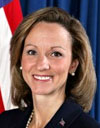 National Gambling Impact Study Commission Final ReportProblem and Pathological Gambling
National Gambling Impact Study Commission Final ReportProblem and Pathological GamblingThe Commission respectfully recommends that all governments take every step necessary to implement all relevant components of the recommendations listed here before lotteries or any other form of legalized gambling is allowed to operate or to continue to operate.
Such requirements should be specifically itemized in a state statute as applicable to a state-run lottery. Similarly, such requirements should also be specified and made applicable for inclusion in tribal government law and tribal-state compacts.
4-1 The Commission respectfully recommends that all relevant governmental gambling regulatory agencies require, as a condition of any gambling facility’s license to operate, that each applicant adhere to the following:
— Adopt a clear mission statement as to applicant’s policy on problem and pathological gambling.
— Appoint an executive of high rank to execute and provide ongoing oversight of the corporate mission statement on problem and pathological gambling.
— Contract with a state-recognized gambling treatment professional to train management and staff to develop strategies for recognizing and addressing customers whose gambling behavior may strongly suggest they may be experiencing serious to severe difficulties.
— Under a state “hold harmless” statute, refuse service to any customer whose gambling behavior convincingly exhibits indications of a gambling disorder.
— Under a state “hold harmless” statute, respectfully and confidentially provide the customer (as described above) with written information that includes a state-approved list of professional gambling treatment programs and state-recognized self-help groups.
— Provide insurance that makes available medical treatment for problem and for pathological gambling facility employees.
4-2 The Commission recommends that each state and tribal government enact, if it has not already done so, a gambling privilege tax, assessment, or other contribution on all gambling operations within its boundaries, based upon the gambling revenues of each operation. A sufficient portion of such monies shall be used to create a dedicated fund for the development and ongoing support of problem gambling-specific research, prevention, education, and treatment programs. The funding dedicated for these purposes shall be sufficient to implement the following goals:
— Undertake biennial research by a nonpartisan firm experienced in problemgambling research to estimate the prevalence of problem and pathological gambling among the general adult population. Specific focus on major subpopulations including youth, women, elderly, and minority group gamblers should also be included. An estimate of prevalence among patrons at gambling facilities or outlets in each form of gambling should also be included.
— Initiate public awareness, education, and prevention programs aimed at vulnerable populations. One such purpose of such programs will be to intercept the progression of many problem gamblers to pathological states.
— Identify and maintain a list of gambling treatment services available from licensed or state-recognized professional providers, as well as the presence of staterecognized self-help groups.
— Establish a demographic profile for treatment recipients and services provided, as state and federal laws permit. Develop a treatment outcome mechanism that will compile data on the efficacy of varying treatment methods and services offered, and determine whether sufficient professional treatment is available to meet the demands of persons in need.
— When private funding is not available, subsidize the costs of approved treatment by licensed or state-recognized gambling treatment professionals for problem and pathological gamblers as well as adversely affected persons. Additionally, such funds shall ensure that persons in need of treatment can receive necessary support based upon financial need. Treatment cost reimbursement levels and protocols will be established by each state.
4-3 Despite the fact that pathological gambling is a recognized medical disorder, most insurance companies and managed care providers do not reimburse for treatment. The Commission recommends to states that they mandate that private and public insurers and managed care providers identify successful treatment programs, educate participants
about pathological gambling and treatment options, and cover the appropriate programs under their plans.
4-4 The Commission recommends that each gambling facility must implement procedures to allow for voluntary self-exclusion, enabling gamblers to ban themselves from a gambling establishment for a specified period of time.
4-5 The Commission recommends encouraging private volunteerism of groups and associations working across America to solve problem gambling, especially those involving practitioners who are trying to help people who are problem gamblers. This should include strategically pooling resources and networking, drawing on the lists of recommendations these organizations have presented to the Commission, and working to develop uniform methods of diagnosis.
4-6 The Commission recommends each state-run or approved gambling operation be required to conspicuously post and disseminate the telephone numbers of at least two state-approved providers of problem-gambling information, treatment, and referral support services.


